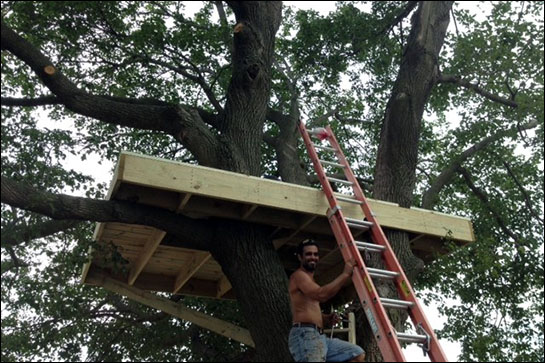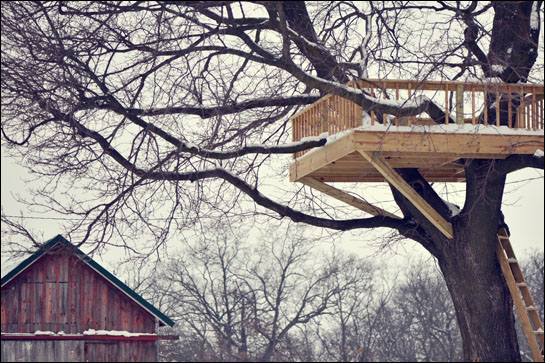What if someone doesn’t like to learn from books?

It’s not enough to say individual learning styles exist. We have to respect them. When we lived on the farm, our tree house builder was supposed to be the builder for the room we were adding on to the house. He had no idea what he was doing building that room. But I didn’t figure that out until I called a contractor and the contractor asked to see the blueprints.
Before that moment I thought it was my fault that we never had the right materials when we needed them. I felt bad not paying him for the day, so when he offered to refinish a chair I said sure. He ruined the chair, but I was already in too far, so I pretended the chair was fine.
I needed him out of the house. Out of my way. We had extra lumber everywhere, so I suggested he build a tree house.
He loved the idea.
He ended up needing more lumber. Of course. “I’ll just pick it up on my way tomorrow,” he told me. Then he billed me for it.
As he was building the tree house and I was hiring a contractor to rescue the new room. The contractor’s team pulled up the 75-year-old boards and we marveled over the cursive signatures of the men who built the house. The contractor explained that the house is Wisconsin vernacular architecture, and sometimes the carpenters were also the designers.
Meanwhile, I noticed he was weaving the structure among the tress. So I asked him about how he learned to do this.
He said, “I’ve never been interested in things that could be taught from a book. I wanted to understand things that were inside me that made me myself.”
He paused. I tried to think of something to say, but I could only think about how much his wife must hate listening to him talk like this.
Then he said, “I don’t make drawings. I can feel it. I can feel the empty space. I’m not an engineer, but I have a good intuition about danger. I’ve had structural engineers visit and they gave me the thumbs up. People are very anxious about things that don’t have blueprints. But I instinctively know when it’s done.”
That’s my perfect homeschool lesson. I wrote down what he said so I know what it sounds like when someone is describing a learning process so different than mine that I almost miss his genius.
So the contractor finished the extra room and our builder finished the treehouse. When he was done I had him sign an inside plank.


He talks about space and danger like it’s art instead of science! That’s interesting.
I’m an intj, my older one an infj. So I understand him. My younger one however is an estp. Even at 3 years old I see that she’s learning and just interacting with the world in a way that I can’t comprehend. At this point I just let her lead. I worry I can’t support her or, as you said, may miss her genius.
My older kid (INFJ) is similar in type to me (ENTJ) and the younger (ISFP) is really different. At first it was so hard to relate to the one who is different. But then I started reading about how the things I thought were a problem were intrinsic to the ISFP type, and only bad in my eyes. For example loving to shop, obsession with gifts, and caring a lot what other people think
Over time I’ve discovered that the kid who is not like me at all is the one who teaches me the most and opens my mind to completely new ways of going through life.
I can imagine that in the future. Thanks. I see “faults” such as an insane drive to win and compete, admiring others’ appearances, inability to sit down and focus. And I realise how those are not so much faults than traits.
I remember the mom of an Olympic champion once saying “don’t correct character faults”. It was maybe directed more to the parents to be open and respectful of their child’s traits, that can become strengths.
I’m still thinking about the phrase “feeling the open space”. It reminds me of the space in words and sentences you often refer to in writing.
Can’t follow this post at all. He, he, he, he while talking about two he’s. Which he is which? And I’m confused by the plot hole where the idiot, who does not achieve anything at all, is considered a genius by the end. Why? 0/5 stars
Here’s something to think about: I don’t think our achievements define us.
At any rate, the point of the piece is that finding each person’s way of seeing the world is a much more interesting way to live than saying there’s a right way and wrong way to go through life.
I didn’t really read it carefully because it’s boring but that point, when applied to how people learn, would have some more kick if the subject with the alternative learning style turned out to be really good in the end. Maybe make up a new story where that happens, to make your point. It sounds like you were trying to, with something about weaving the structure in the tree, but it didn’t land. The builder can be an underdog and the contractor says “the builder can never achieve it without blueprints, this is lunacy!” And then you take a bet on the builder anyway because he really needs the money because his kid has cancer and remarkably he builds a masterpiece and it becomes the new standard of Midwestern farmhouse additions throughout the land. Totally doesn’t work when he has an alternative style, but then he sucks, and somehow he’s a genius anyway. Or maybe the point should be “some people suck at their jobs while simultaneously having an ego about it and putting in low effort, and that’s okay”? That might line up better. Food for thought.
I would guess one of the main differences between your thinking and the tree house builder’s thinking is your level of paying attention to detail, which makes your writing so enjoyable. It also makes construction precise and more cost effective. How fun for him to go out there and build a tree house, feeling the contours of the tree and accommodating for them in an instinctive way. I have no training or licensing in construction but have done many remodel projects fairly instinctively, and I do enjoy working with non licensed craftspeople, but I do become a little bit of the sergeant project manager making sure we have the right materials and getting anal over the finishes. And I do reach out for the licensed folk for precision and cost effectiveness when it requires it. Like when we had a massive sewer line issue once. But I became very friendly with the main plumber guy and he referred me to his unlicensed cousin who’s done a ton of other stuff for me. Anyways, fun read. Insightful and thoughtful as always.
“Meanwhile, I noticed he was weaving the structure among the tress.”
You mean the truss. Slight differences in spelling with very different meanings.
“Then he said, “I don’t make drawings. I can feel it. I can feel the empty space. I’m not an engineer, but I have a good intuition about danger. I’ve had structural engineers visit and they gave me the thumbs up. People are very anxious about things that don’t have blueprints. But I instinctively know when it’s done.”
He doesn’t make drawings. That would make me anxious too. Drawings are a builder’s way to communicate with the customer the design of a structure and a basis to generate a list of materials (and thus the cost) necessary for the project. Drawings aren’t set in stone and can be amended as necessary with approval. Everything is documented. Substitute the words drawings and blueprints with contracts. Wouldn’t it make you anxious about working a job without a contract? Nothing is specified but the other person instinctively knows when the job is done.
HI – I find that when kids these days do NOT want to rely on books; their career aspirations can best be described as ‘internet researcher’. Everybody knows how to google, kiddos…
So, it is a problem!
What I like to say; only occasionally, is that the internet is full of unvetted opinions, mainly. I like to use it to source recipes…news. You have to be very careful when you use info from the internet…I think there was a realization ?upteen years ago when people started to say: stop capitalizing the word ‘internet’.
The friction in the classrooms must be formidable! The poor teachers…themselves not given any instruction on using the internet except on how to ?notate…there has to be a consensus!
Please, help! Maybe vetting internet resources, but only maybe! Non-fiction sourcing should be emphasized/preferred! I have heard that libraries in the USA have been closed down and/or are closing down. However; the news is not all grim!
Why not use apps like Libby? why not a cheaper book subscription service like Amazon does? Why not source vetted textbooks online at the library and/or your home computer? Based on a subscription…accelerating access/charges based on info security…etc?
Anyhow…could be mucho fun!
For me, occasionally, I like to source 100 level university courses…their lectures on youtube. The lecturers/profs who have been posted online usually have very polished and informative lectures…enervating, engaging…because they are freshman courses…and they are trying to ensnare! They want the kids to choose their faculty
Interesting that you say all kids today want to be some version of Internet researcher. I think there’s truth to that. But in the future we’ll all be working in artificial intelligence. We’ll be AI prompters; the AI will do the research and we’ll be telling it how to search the data. So, in a way, the Internet is coming to an end — we will be post Internet soon, so it’s late to be railing against it.
Penelope
I keep coming back this. It is interesting the way different people learn. My boyfriend learns better by watching and trying it. Lots of YouTube tutorials if he’s interested. He may be able to force himself to read instructions ( only if he really needs to to).
And I keep thinking Carpenter rather than than builder . I mostly associate working with wood mainly as carpentry and mixed materials as a builder. Yet many houses are made from mainly wood ,not really in my country. So I need to change my thinking